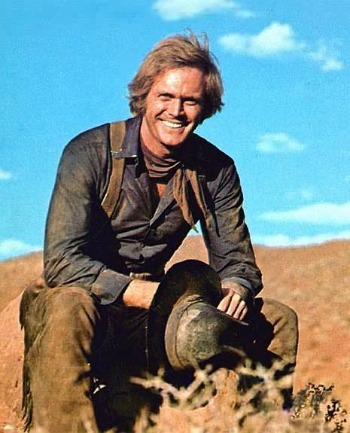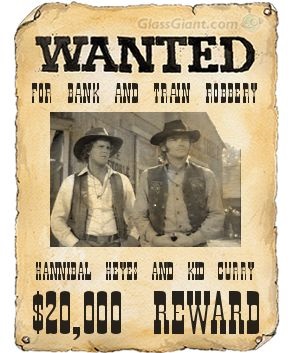 A Fan Tribute to Celebrate 40 Years -
A Fan Tribute to Celebrate 40 Years -
Heyes 2.0 – In Defense of the Indefensible
by FortitudinePoor Roger Davis. As a military historian, I am reminded of a comment made by Confederate General J.E.B. Stuart about another officer’s decision at a key juncture – he shall regret it but once, and that continuously.
Here is a man with a solid professional background in his craft; in the early 1960’s he had a regular role in The Gallant Men (in which he was so cute and boyish that he won my then seven-year-old heart) and paid his dues in the cult classic soap opera Dark Shadows. His big-screen appearances were limited, but he regularly guest-starred on series such as The Bold Ones, Medical Center, and Bonanza and in made-for-TV movies. His distinctive voice, often compared to a young Henry Fonda’s, netted him work doing voice-overs. He had an unspectacular but steady future ahead of him when he signed to replace actor, Pete Duel, as Hannibal Heyes in the TV Western Series Alias Smith and Jones after Duel’s death. At the time, he must have thought it was a great opportunity, his first shot at playing a lead in a primetime series.
I was sixteen that year. ASJ was one of the very few television shows I was allowed to watch, and I still can’t figure out how it snuck in under my father’s strict radar – but then Dad spent a couple of years as a wrangler on a dude ranch in California in the late 1940’s, and had a weakness for Westerns. And since TV Westerns usually upheld the traditional American virtues of home, apple pie, the flag, and large-caliber weaponry, he was unaware how morally ambiguous ASJ was. I saw no reason to enlighten him.
Unlike some fans that refuse to even speak of the post-Duel episodes, I watched them at least until the end of that season. When I came across almost the entire series on IMDB about a year and a half ago, I started bouncing around, viewing them in no particular order.
This produced its own peculiar dissonance, as there is no resemblance between Duel and Davis in any way, shape or form. Hannibal Heyes was transformed from a dark-haired young man with a certain raffish, riverboat-gambler elegance into a brash and drawling towhead.
It was a no-win situation for Davis. If he tried to imitate Duel’s interpretation, the false notes would eventually trip him up. And he lacked two of Duel’s greatest assets as the charming, fallible ex-outlaw; a near-perfect sense of comic timing and a mobile, expressive (one might almost say rubber) face. By interpreting Heyes according to his own lights, Davis created a character that was interesting and even charming in its own weaselly way, but not the Hannibal Heyes to thousands of fans then and now.
Someone reading this might assume that I dislike Roger Davis. This is not the case; I think he’s a solid actor. He remains the man we love to hate as Danny Bilson in Smiler With A Gun, and he turned in excellent performances in some of the later episodes (High Lonesome Country and The Ten Days That Shook Kid Curry are personal favorites).
Actually, Davis’ Heyes has always seemed to me to be far more believable as a bad man than Duel’s more light-hearted portrayal. The problem is that the change came too suddenly and the contrast between the two actors was just too jarring. ASJ is, in essence, two separate series. After the loss of Duel, the writing took a more dramatic, sometimes bleaker tone, particularly the episodes dealing with the Johnson County War (What Happened at the XST, Witness to a Lynching, and Bushwhack!). Was this a decision on the part of the producers to play to Davis’ strengths, or was this the intent all along, one wonders? If it was, it’s a sad irony, since one of the reported triggers for Duel’s depression was his desire to move away from comedy and get his teeth into something more serious.
There was an interesting ancillary effect to the change; the Kid stepped out as more of a character in his own right instead of Heyes’ cranky but usually obedient and occasionally goofy sidekick. The relationship between the two became more nuanced and occasionally a lot darker. I will continue to watch the post-Duel episodes because they are for the most part well-written (I must admit that Three To A Bed has some funny scenes, but it baffles me), and the evolution of the Kid’s role is intriguing. Although I’m not planning on quitting the ranks of the heyesiennes anytime soon, it is safe to say that I’ve gained a new appreciation for the character of Kid Curry. He was always written as the more lethal of the two, with a short fuse and a barely controlled berserker streak. Playing against Roger Davis, Ben Murphy allowed more of that inner turmoil to surface than he did with Pete Duel.
After ASJ was cancelled in 1973, Davis spent the rest of the decade appearing in The Rockford Files, Ironside, Wonder Woman and other standbys. There was a short-lived attempt to milk the ASJ concept with a comedy pilot called This Is The West That Was, but it bombed. His acting career stagnated and he moved on to become a successful real estate developer.
Which, when you come to think of it, is a not-unlikely choice for a fast-talking ex-outlaw.
(Writers love feedback! You can tell Fortitudine how you enjoyed the story with a quick comment. Just click Post Reply for the Comments for Heyes 2.0 thread below the story. ) 

